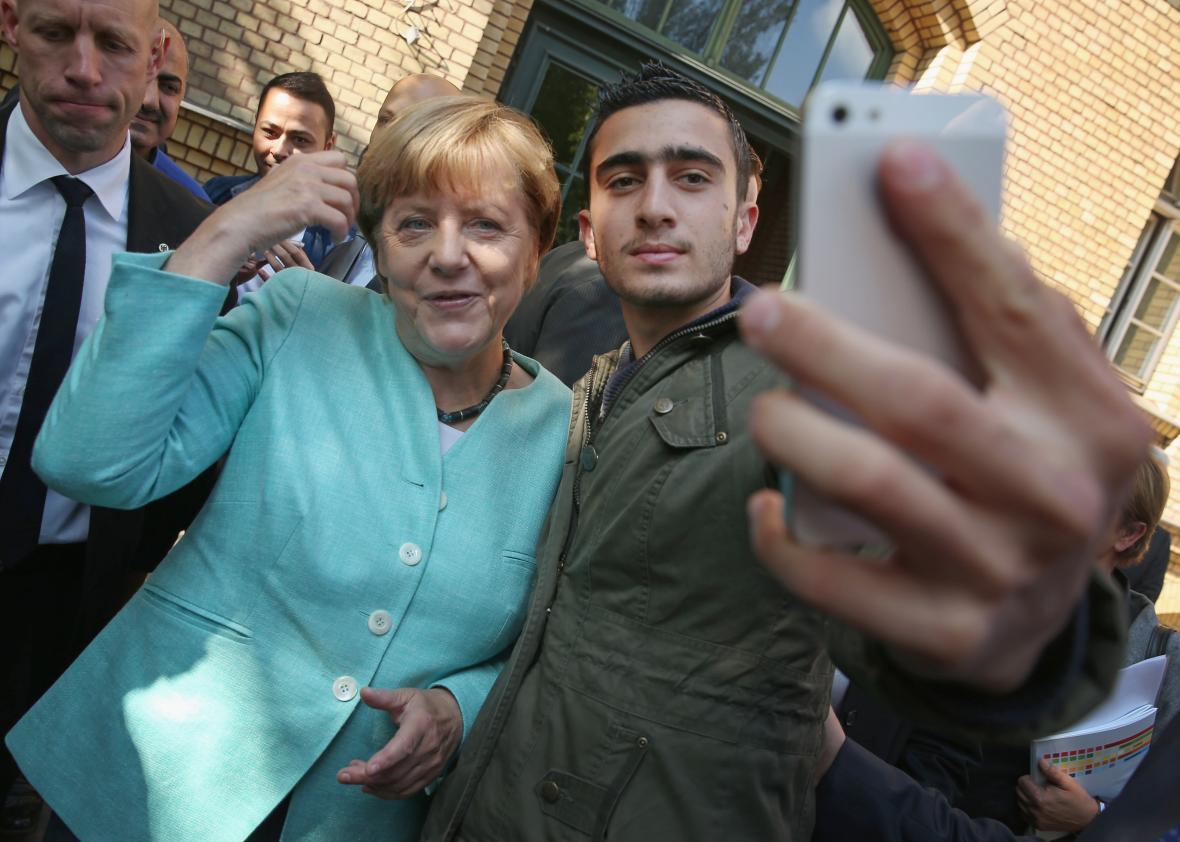For a figure so constantly in the public eye, German Chancellor Angela Merkel is awfully tough to caricature.
For most of the summer, Europe’s most powerful leader was excoriated for her seeming indifference to the plight of Greece, which will suffer years of economic hardship under the European-imposed austerity measures pushed by Germany. In July she was a viral laughingstock after an awkward television appearance in which she bluntly told a sobbing Palestinian teenager why her family couldn’t remain in Germany. So it was surprising to see, in recent weeks, the chancellor emerge as the leading voice calling for compassion in the face of Europe’s unprecedented refugee crisis. Her calls for European countries to do their part in taking in asylumseekers and her excoriation of anti-refugee protests in Germany made Merkel an unlikely folk hero among displaced Syrians. But now the picture has been complicated further: On Sunday, Germany made a U-turn after having opening its frontier to refugees last week, reinstating border controls and leaving many refugees confused.
A common explanation for Merkel’s original willingness to take in refugees is that, having grown up in communist East Germany, she feels particular compassion for the victims of war and repression. But Merkel is neither “Hitler,” to whom she has been frequently compared by Greek protesters, or the “mother of outcasts,” as she has been dubbed on Syrian social media: She’s a pragmatic politician. Merkel may feel compassion based on her history, or some obligation to help refugees given her country’s history, but Germany’s generosity is at least in part economic: With an aging population, Germany needs new workers, and its still-strong economy puts it in a better position than others to absorb the influx.
Merkel also has more political room to maneuver. Unlike some other European leaders, she doesn’t face a major political threat from her right on migration issues. The crisis has drawn some more support to the Euroskeptic Alternative Fuer Deutschland Party, polling at about 5 percent, and there have been rallies and acts of violence by anti-Muslim extremists. But Merkel hasn’t had to contend with anything like the kind of pressure being applied by France’s National Front, Britain’s UKIP, and Denmark’s People’s Party to their governments’ respective policies on migration and refugees. Despite the chaotic scenes of the last few weeks, two-thirds of Germans have strongly backed the government’s welcoming policy in polls and believe the country can cope with the influx.
So then why the shift? The immediate reason was a shortage of beds in refugee reception centers and a generally overwhelmed asylum system, particularly in Bavaria. It may also have been a move to put pressure on other European countries, particularly those to the east, to accept more refugees. I’m not sure that will work. More likely, it will suggest to skeptics in other countries that not even the rich Germans on their moral high horse were able to cope with the consequences of open borders.
For all the selfies and words of concern, Merkel was always an unfortunate standard-bearer for the welcome-the-refugees side of the debate. Throughout the economic crisis, poorer countries on the periphery of the EU have bristled over what they saw as German attempts to use its influence in Brussels to meddle in their internal affairs on issues of taxes and social spending. Now, poorer countries on the periphery of Europe are bristling over what looks like Germany using its influence in Brussels to meddle in their control of their own populations and borders.
Despite its reversal, Germany is still doing more than any other country, with the possible exception of Sweden, to take in refugees—and evidence suggests asylum seekers still see it as the most promising refuge. Whether that’s true or not in the coming months will depend a lot more on Merkel’s political position than on her compassion.
Also in Slate, see the latest photographs from the European refugee crisis.
